 Petzlover
Petzlover Miniature English Bulldog is originated from United Kingdom but Spitz is originated from Russia. Miniature English Bulldog may grow 35 cm / 13 inches shorter than Spitz. Miniature English Bulldog may weigh 22 kg / 48 pounds lesser than Spitz. Miniature English Bulldog may live 4 years less than Spitz. Miniature English Bulldog may have less litter size than Spitz. Both Miniature English Bulldog and Spitz requires Moderate Maintenance.
Miniature English Bulldog is originated from United Kingdom but Spitz is originated from Russia. Miniature English Bulldog may grow 35 cm / 13 inches shorter than Spitz. Miniature English Bulldog may weigh 22 kg / 48 pounds lesser than Spitz. Miniature English Bulldog may live 4 years less than Spitz. Miniature English Bulldog may have less litter size than Spitz. Both Miniature English Bulldog and Spitz requires Moderate Maintenance.
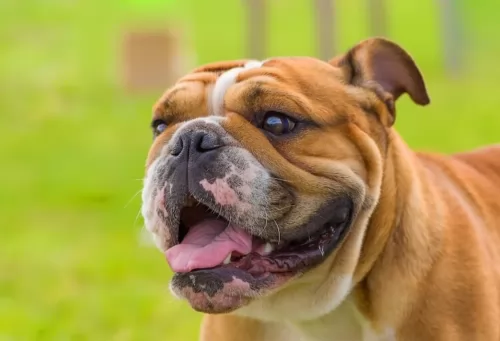 The Miniature Bulldog is such a cute little dog, hailing from England in the 18th and early 19th centuries. The exact development of the dog is unclear and it seems as though the breeders weren’t working together and were working in two different directions.
The Miniature Bulldog is such a cute little dog, hailing from England in the 18th and early 19th centuries. The exact development of the dog is unclear and it seems as though the breeders weren’t working together and were working in two different directions.
There is a lot of debate about the very name ‘miniature’ too because some breeders gave this name to a hybrid mix of a Pug and Bulldog. It seems some breeds were created by crossing English Bulldogs with French Bulldogs to decrease their size. Certainly the origins for the Miniature Bulldog are unknown and there isn’t one particular breeder who can be credited with developing the breed.
Because the Miniature Bulldog is a hybrid breed, it isn’t accepted by the AKC, but it is accepted by the American Canine Hybrid Club as well other registries.
 A spitz is not a breed of dog, but rather a “group or family” of dogs that has its roots in Germany. Within this family there are a variety of breeds that were bred for very specific purposes by people in many different parts of the world. The spitz family can be toy dog size up to vey large. Examples run from the Pomeranian to the Canadian Eskimo Dog.
A spitz is not a breed of dog, but rather a “group or family” of dogs that has its roots in Germany. Within this family there are a variety of breeds that were bred for very specific purposes by people in many different parts of the world. The spitz family can be toy dog size up to vey large. Examples run from the Pomeranian to the Canadian Eskimo Dog.
The Spitz family dogs share the look of thick, long fur and pointed muzzles, ears and curly tail. Despite their German name, they are thought to originally be of East Asia or Artic descent. Most of today’s spitz are from Siberia’s Artic region, first described in 1788 and in English in 1792. Spitz have been bred for three types of jobs depending upon where they were developed. These jobs included pulling, herding and hunting.
There are very powerful and large Spitz breeds that pull or hunt large game. Examples of these breeds are the Swedish Elkhound, the Akita Inu, the Norwegian Elkhound and the Karelian Bear Dog. The smaller sized breeds like the Samoyed hunted small mammals and birds, while the Finnish Lapphund, Lapponian Herder, and Swedish Lapphund herded, hunted and pulled small sleds.
The three largest spitz also pulled sleds throughout the 17th and 18th centuries. In most places the Canadian Eskimo Dog, the Alakan Malamute and the Greenland dog were used in sled racing and fur trapping while in Canada and Alaska the Siberian Husky was used for the same things.
Recently there have been genetic tests that show a large number of dogs that are considered Spitz type so share many strong ancestral ties and DNA similarities with wild wolves. It is now believed that a lot of these breeds were intentionally mated with wolves and some were accidental. Both domestic and wild dogs are included in this history.
Most spitz are made for cold weather, even today’s lapdogs, like the Pomeranian, do not do well in hot climates.
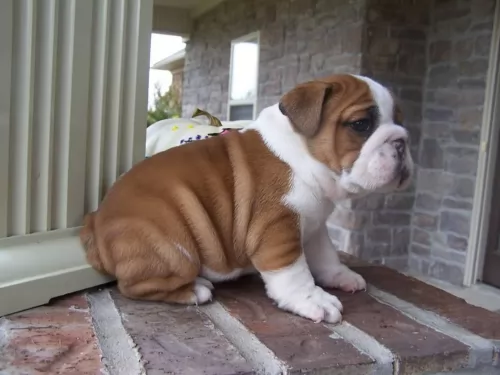 Because the Miniature Bulldog is a cross between two purebred breeds – the Pug and the English Bulldog. You can expect different looks and characteristics from each breed.
Because the Miniature Bulldog is a cross between two purebred breeds – the Pug and the English Bulldog. You can expect different looks and characteristics from each breed.
Your mini Bulldog is a small breed dog standing between 25 and 35cm male and female and weighing between 11 and 18kg. The average litter size for these dogs is about 4 puppies.
The Miniature Bulldog has a short coat which sheds moderately and that comes in different colors such as tan and white, brindle, with black and grey also having a show in.
The Miniature Bulldog is a social, friendly breed who is able to get on well with all members of the family, including children and pets in the home. His very stature makes it that he isn’t the most active of dogs, but nonetheless you still want to exercise him and take him for walks to avoid obesity.
As with all dogs, training and socialization are imperative because this is a strong-willed dog who wants to go his own way.
 Most of the spitz breeds share a “look” that includes erect ears, stocky heavy, usually double coats, a pointed muzzle, thick, fluffy ruffs and a heavy curled tail carried high over the body. Build for northern climates they are insulated by a undercoat that is waterproof and dense and a less dense topcoat. Their ears are small to prevent frostbite and their paws have thick fur to protect them in the frigid, icy terrain.
Most of the spitz breeds share a “look” that includes erect ears, stocky heavy, usually double coats, a pointed muzzle, thick, fluffy ruffs and a heavy curled tail carried high over the body. Build for northern climates they are insulated by a undercoat that is waterproof and dense and a less dense topcoat. Their ears are small to prevent frostbite and their paws have thick fur to protect them in the frigid, icy terrain.
Many still have wolf-like looks and tendencies. Some are very difficult to train to be companions – the Akita, Chow and especially the Karelian Bear Dog – fall into this category. Many mixed breed dogs are also considered members of the Spitz family. These dogs are easy to recognize as spitz because of these physical characteristics
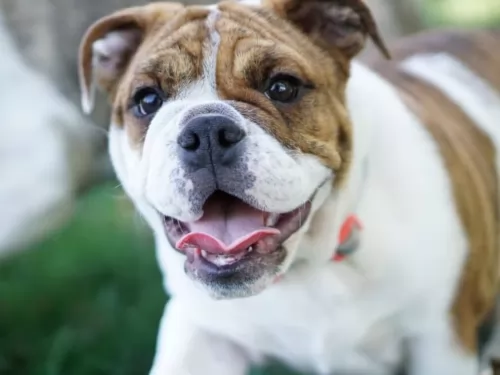 You’ll love having one of these entertaining, friendly dogs by your side. He is docile, social, fun and a bit stubborn too but he is able to get on well with children in the home as well as with other pets.
You’ll love having one of these entertaining, friendly dogs by your side. He is docile, social, fun and a bit stubborn too but he is able to get on well with children in the home as well as with other pets.
He can adapt to life in the city as well as in the countryside as he doesn’t require too much exercise.
Take special care of him and he’ll make you a splendid family pet.
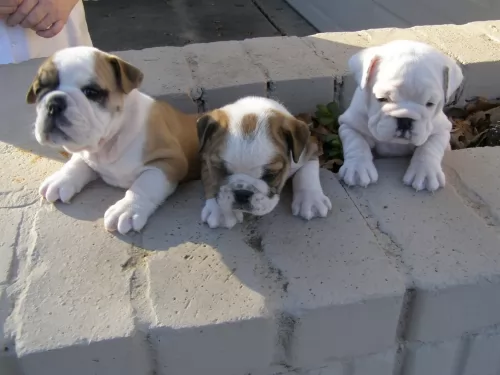 Unfortunately the origins of the Miniature English Bulldog are not 100% clear and therefore other important information isn't readily available.
Unfortunately the origins of the Miniature English Bulldog are not 100% clear and therefore other important information isn't readily available.
These dogs are always prone to breathing and nasal abnormalities because of the shape of their faces as well as being prone to heart deficiencies. Snoring, grunting and quite a bit of panting is part and parcel of the mini English Bulldog.
They’re also prone to overheating, cherry eye and hip dysplasia. It is most unlikely that your Miniature English Bulldog is going to get any of these illnesses and the good news is that he can live to be up to 12 years of age.
 It is a little harder to characterize the health issues of a family of dogs than it is a .will overheat in hot climates due to their double coats. Here are some propensities of dogs in the Spitz family.
It is a little harder to characterize the health issues of a family of dogs than it is a .will overheat in hot climates due to their double coats. Here are some propensities of dogs in the Spitz family.
• Thrombopathia bleeding disorder with the risk of a hemorrhage, platets don’t clot.
• Larger breeds are affected by Elbow and Hip dysplasia that can cause arthritis and lameness.
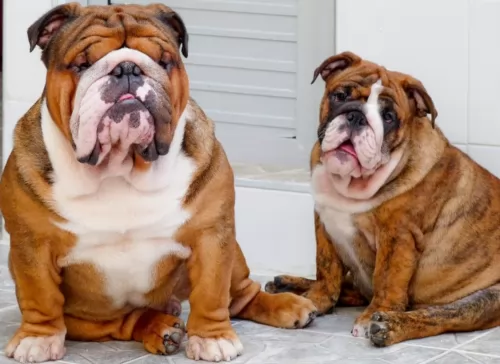 Feeding the Miniature English Bulldog is hugely important. It is imperative that he doesn't become obese. Buy the best dog food there is and see to it that he also gets some home-made food. Chop up boiled chicken, brown rice ad vegetables for your pet and mix occasionally into his dry kibble.
Feeding the Miniature English Bulldog is hugely important. It is imperative that he doesn't become obese. Buy the best dog food there is and see to it that he also gets some home-made food. Chop up boiled chicken, brown rice ad vegetables for your pet and mix occasionally into his dry kibble.
Dogs love simple food – their stomachs can’t cope with different foods. They appreciate consistency with uncomplicated but nutritious foods. The bulldog is a dog which can easily overheat, so make sure he has constant access to fresh cool drinking water. On a hot day you can even use a spray bottle and allow some spray mist sprayed into his face to cool him down.
The Mini English Bulldog is a dog that sheds so you will need to brush him at least twice a week to get rid of loose hair.
Check around his eyes and inside his ears for infection.
Brush his teeth 2 or 3 times a week to get rid of plaque so as to prevent dental decay which can be detrimental to his health.
His face and body have wrinkles, making him more susceptible to skin allergies and you’ll need to keep your eye open for these as they can be terribly painful and frustrating for your pet.
Keep his nails trimmed.
He is neither sleek, agile or quick and you can see just by looking at him that he isn’t designed for being sporty. A slow walk every day will be enough for him as well as some easy-going games inside.
 1Feeding the puppy The Spitz family has high energy needs but in a slow-release so they need protein more than grain. Puppies should be fed 3-4x a day in small meals. Don’t overfeed them.
1Feeding the puppy The Spitz family has high energy needs but in a slow-release so they need protein more than grain. Puppies should be fed 3-4x a day in small meals. Don’t overfeed them.
2.Feeding the adult – The Spitz type dog stores their energy to use in extended periods when working or playing. They will become obese if overfed or if they don’t get enough exercise. Feed 2-3X a day in small or medium sized meals, even the larger breeds because of their storage of calories.
4. Games and Exercises – Having been bred for endurance and stamina most Spritz breed need plenty of exercise, lots of space and lots of play. They love to run, jog, or play games. They are outdoors types who love to hike, and run or walk for long times over long distances. They are great in cold, wet weather but not so good in the heat. How much exercise they need depends on the size and history of the specific breeds. Most love to play with other dogs, so dog parks and dog day care can both be good choices for most of them. Agility, barnhunt, field trials, pulling games are all good choices.